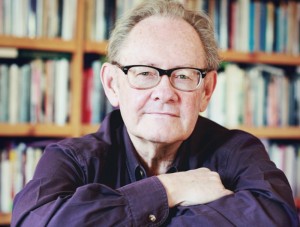
Photo: Kimberly Anderson
A Thumbnail Autobiography
I was born on the westernmost edge of the Great Plains. My parents made sure there were lots of books in the house for my younger brother and me, but what I read most avidly was Poe, and to this day my work displays some Poe-ish qualities. I graduated from the University of Northern Colorado in 1972, Summa Cum Laude thanks not a scholarship but to a creative thesis, a collection of poems called The Crow-Man. I received an M.F.A. from the University of British Columbia in 1974, where I studied with the very underrated Irish expatriate poet, fiction writer and essayist George McWhirter; the musicality and imaginative openness of his work are qualities I aspire to in my own.
In the “real life” that followed graduate school I worked in a variety of jobs, from clerking in a book store to substitute teaching in and around Denver. I toyed for a long while with the idea of pursuing a Ph.D., but those were the heydays of Barthes and Derrida, who struck me as intellectual con-men (they still do), and I felt there was a good deal of bad faith in the whole process. I remember dipping my toes in those academic waters by auditing a class focused on Deconstruction. The professor in charge remarked that the theories we’d be studying were “mainly crap,” but added, “Of course, you’ll have to learn them if you hope to get a teaching job.” A few months later a friend of mine, at the fag-end of his Ph.D. experience at the same institution, was blocked from writing his thesis on John Fowles, because (according to his advisor) “Fowles isn’t a serious writer.” The sheer idiocy of that statement soured me on further formal education, but what it boiled down to was the realization that I was too arrogant and pig-headed for such games.
Luckily, I stumbled into a position as a staff marketing writer for a large Colorado-based bank network, and ever since I’ve mostly made my living as a writer for hire, although I occasionally taught both online and face-to-face courses for both undergraduate and graduate-level students. Today, I work as an Academic Director for two programs, Arts and Culture Management and Professional Creative Writing, at the University of Denver’s University College.
My one claim to fame, aside from the modest audience that has developed in response to my poems, is my appointment by then-Governor John Hickenlooper to the position of Colorado Poet Laureate.
I served in that capacity from July 2014 to July 2019, and over that time participated in just shy of 100 events across the state, including poetry readings, workshops, classroom visits, interviews, library presentations, and some official gatherings such as Poetry Out Loud state finals, where I functioned as an emcee. Having been born and raised in Denver, my sense of Colorado poetry was Front Range-centric; serving as Poet Laureate taught me that Colorado is seeing a renaissance of poetry from plains to mountains to western slope valleys, and I remain grateful for all that I’ve learned from and about my expanded community of poets. Also, as Poet Laureate I’ve worked with the editors of the online Colorado Encyclopedia to create a first iteration of the Encyclopedia’s poetry section. My aim was to make the work of a pilot-group of poets, who live all around the state, available to K-12 educators and others free of charge, in the hope that they will bring poets in or near their communities into their classrooms and even begin to integrate poetry into classes across the curriculum. After all, poetry is not just an instrument for teaching writing techniques in English classes, it is also an ancient form of knowledge about the world and our experience of it that simply cannot be gotten any other way.
On a more personal, autobiographical note, I live with my wife, Melody Madonna, a marvelous yoga teacher, in the mountains southwest of Denver. Cohabiting with us is our chihuahua Frida, after the amazing Mexican artist Frida Kahlo.
In all the years of my writing life, I’ve responded to and aspired to a quality in poetry that I can only call “clarity.” Not that I’m interested in clarity at the expense of honest complexity; I despise those bland accounts of near-death sailing “into the Light.” Light is not always benign: it blinds as often as it offers revelation, as anyone who’s grown up in my part of the world would know. That contradiction, if it is one (it could be that contradiction exists only in the mind), fascinates me continually. When the writing is going well, it’s the feeling of seeing into that alerts me to the fact. I get the same feeling from reading anyone else’s good poem. In one entitled “Small Wild Crabs Delighting on Black Sand,” James Wright says, “I don’t want to know. I want to see.” That’s what I say.

 Joseph Hutchison, Colorado Poet Laureate 2014-2019, has published 20 collections of poems and edited or co-edited three poetry anthologies. He currently directs two master’s-level programs for University College at the University of Denver: Professional Creative Writing and Arts & Culture Management. Joe lives with his wife, Melody Madonna, in the mountains southwest of Denver, Colorado, the city where he was born.
Joseph Hutchison, Colorado Poet Laureate 2014-2019, has published 20 collections of poems and edited or co-edited three poetry anthologies. He currently directs two master’s-level programs for University College at the University of Denver: Professional Creative Writing and Arts & Culture Management. Joe lives with his wife, Melody Madonna, in the mountains southwest of Denver, Colorado, the city where he was born. 









